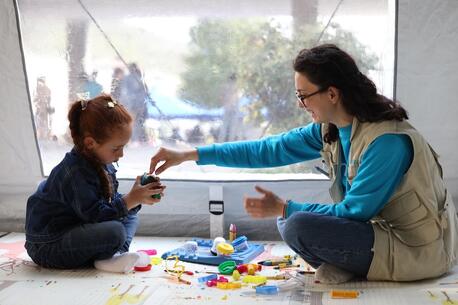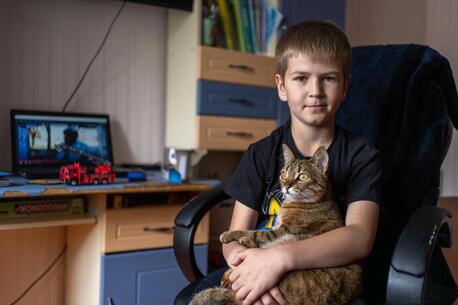
Teaching Inclusivity in a Romanian Kindergarten
In a cheerful classroom at Kindergarten No. 9 in Brasov, Romania, 4- and 5-year-olds play happily together with puppets and building blocks. A group of Ukrainian children joined the school in late March, after their families were forced out of their homes by the war in Ukraine.
"My class is a great class. Our nickname is the Butterfly Class," says teacher Bianca Secelean. "They are very sweet and very good children. And also their relationship with their parents is very good."
The school serves about 250 children; 50 percent have food allergies and 10 percent have special needs. One student is deaf, others have autism. UNICEF is partnering with the school's teachers to build capacity and expand curriculum to provide a more inclusive learning experience for all students. Differences are celebrated here, and everyone feels welcome.
For kindergarteners, a sense of belonging:
For now, because of the language barrier, the children from Ukraine have their own room, where they are taught in Ukrainian by parent volunteer teachers. The classroom is a little bit of home after so much uncertainty and upheaval, a place where they can relax and play and just be kids again.
"We are teaching our children to accept everybody," says Secelean. "It doesn't matter the problems they have. We teach them not to see this as a problem if a child can't hear properly. We always explain to them that this is a special child, and we believe this should happen also in school.
"And if the children will be more open and they somehow manage to teach their parents to be more open, I think it's a good start for us."
UNICEF works with partners around the world to help children grow up healthy and happy so they can reach their full potential. Your contribution can make a difference. Please donate.
Top photo: Two kindergarteners worked together to build something beautiful at their school, Kindergarten No. 9, in Brasov, Romania. © Adrian Holerga for UNICEF. Video by Tong Su for UNICEF USA
Displaced by violence in Ukraine, refugee children find a sense of belonging in Romania. [VIDEO]
HOW TO HELP
There are many ways to make a difference
War, famine, poverty, natural disasters — threats to the world's children keep coming. But UNICEF won't stop working to keep children healthy and safe.
UNICEF works in over 190 countries and territories — more places than any other children's organization. UNICEF has the world's largest humanitarian warehouse and, when disaster strikes, can get supplies almost anywhere within 72 hours. Constantly innovating, always advocating for a better world for children, UNICEF works to ensure that every child can grow up healthy, educated, protected and respected.
Would you like to help give all children the opportunity to reach their full potential? There are many ways to get involved.





